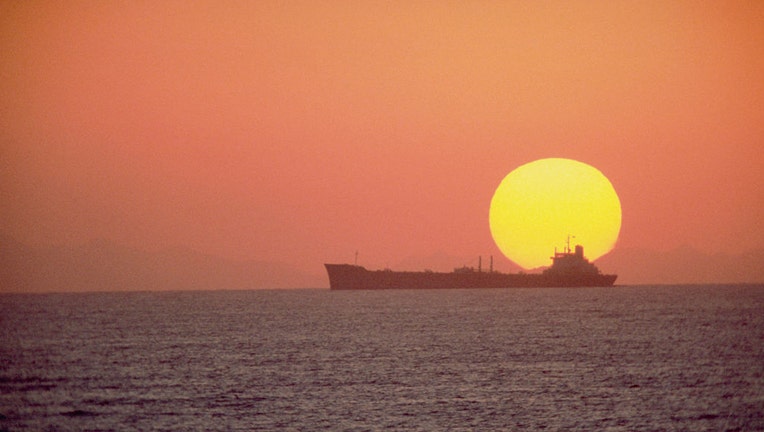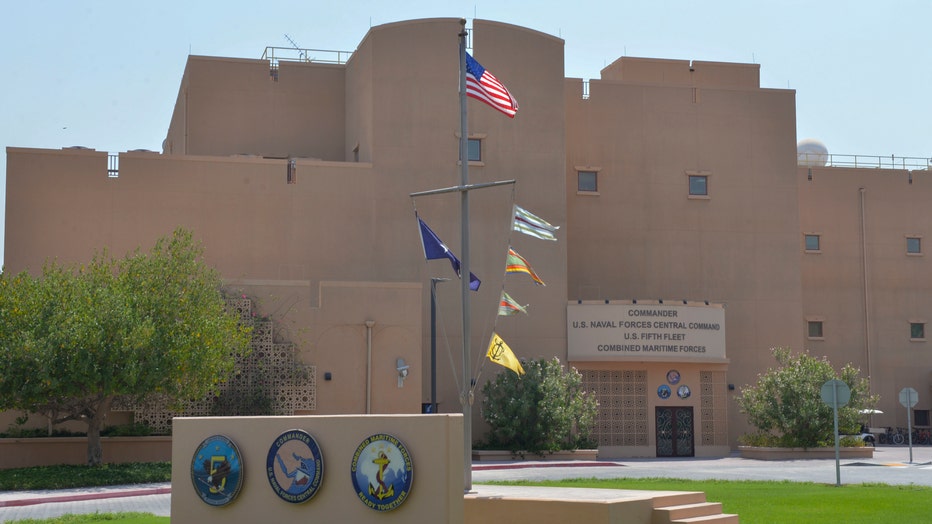Houston-bound oil tanker seized by Iran navy in Gulf of Oman

FILE - The setting sun silhouettes an oil tanker. (Photo by © CORBIS/Corbis via Getty Images)
DUBAI, United Arab Emirates - Iran's navy seized a Marshall Islands-flagged oil tanker in the Gulf of Oman on Thursday heading to the U.S. amid wider tensions over Tehran's nuclear program, the latest-such capture in a waterway crucial for global energy supplies.
The U.S. Navy's Mideast-based 5th Fleet identified the vessel as the Advantage Sweet. Satellite tracking data for the vessel from MarineTraffic.com showed it in the Gulf of Oman, just north of Oman's capital, Muscat, on Thursday afternoon. It had just come from Kuwait and listed its destination as Houston.
The Advantage Sweet issued a distress call at 1:15 p.m. while in international waters as Iran seized the vessel, the Navy said.
"Iran’s actions are contrary to international law and disruptive to regional security and stability," the 5th Fleet said in a statement. "Iran should immediately release the oil tanker."
The Navy initially said Iran's paramilitary Revolutionary Guard seized the vessel, but an American naval aircraft later confirmed that Iran's navy captured the ship, 5th Fleet spokesman Cmdr. Timothy Hawkins told The Associated Press.
Iran's state-run IRNA news agency said the seizure came after an "unknown ship collided with an Iranian vessel last night in the Persian Gulf, causing several Iranian crew members to go missing and get injured." It did not identify the other ship involved in the alleged collision.
The Advantage Sweet had been in the Persian Gulf on Wednesday, but its track showed no unusual behavior as it transited through the Strait of Hormuz, where a fifth of all traded oil passes. Iran has made allegations in other seizures that later fell apart as it became clear Tehran was trying to leverage the capture as a chip to negotiate with foreign nations.
Iran’s "harassing activity within the Persian Gulf and Gulf of Oman is commensurate with an established pattern of behavior that has seen Iran target vessels as a result of ongoing disputes," maritime security firm Dryad Global said.
The 5th Fleet said the Iranian seizure was at least the fifth commercial vessel taken by Tehran in the last two years.
"Iran's continued harassment of vessels and interference with navigational rights in regional waters are a threat to maritime security and the global economy," it added.

File photo of U.S. Naval Forces Central Command, U.S. 5th Fleet and Combined Maritime Forces headquarters on Naval Support Activity Bahrain. (Credit: U.S. Navy photo)
U.S. Army Gen. Erik Kurilla, the top U.S. commander for the Middle East, said in a statement that the "illegal seizure" of the tanker was ""another in a continuing series of violations by Iran of the international rules-based order."
The vessel's manager, a Turkish firm called Advantage Tankers, issued a statement acknowledging the Advantage Sweet was "being escorted by the Iranian navy to a port on the basis of an international dispute." All the ship's 24 crew members are Indian.
"The safety and welfare of our valued crew members is our No. 1 priority," the firm said. "Similar experiences show that crew members of vessels taken under such circumstances are in no danger."
The ship's listed owner appeared to be a Chinese company.
Manifest information from data firm Refinitiv showed the Advantage Sweet carried Kuwaiti crude oil for American energy firm Chevron Corp. of San Ramon, California. Chevron said it was "aware of the situation."
"We are in contact with the vessel operator with the hope of resolving this situation as soon as possible," Chevron spokesperson Christine Dobbyn said in a statement.
Thursday's seizure by Iran was the latest in a string of ship seizures and explosions to roil the region.
The incidents began after then-President Donald Trump unilaterally withdrew the United States from Iran’s nuclear deal with world powers, which saw Tehran drastically limit its enrichment of uranium in exchange for the lifting of economic sanctions.
Drone strike in Syria: Biden remarks on Iranian drone strike, U.S. counterstrike | LiveNOW from FOX
President Biden ordered a series of retaliatory precision airstrikes in Syria on Thursday, reportedly killing eight Iranians, after Iran’s Islamic Revolutionary Guards Corps crashed a UAV into a building, killing a U.S. contractor and wounding six other Americans. Biden made remarks about the drone strike during a joint press conference with Canadian Prime Minister Justin Trudeau. "The United States does not seek conflict with Iran," President Biden said. "Be prepared for us to act forcefully and protect our people. That's exactly what happened last night." More LiveNOW from FOX streaming video
Also, the U.S. Navy has blamed Iran for a series of limpet mine attacks on vessels that damaged tankers in 2019, as well as for a fatal drone attack on an Israeli-linked oil tanker that killed two European crew members in 2021.
Tehran denies carrying out the attacks, but a wider shadow war between Iran and the West has played out in the region’s volatile waters. Iranian tanker seizures have been a part of it since 2019. The last major seizure came when Iran took two Greek tankers in May and held them until November.
In the wider Mideast, Iranian-backed militias in Syria have carried out attacks on U.S. forces, including one that killed a contractor in March. The U.S. responded with airstrikes.
Meanwhile, talks over Iran’s tattered nuclear deal have been stalled for a year. Since the deal’s collapse, Iran runs advanced centrifuges and has a rapidly growing stockpile of enriched uranium. The head of the International Atomic Energy Agency has warned Iran has enriched enough up to 60% purity — a short technical step from weapons-grade levels of 90%. That would be sufficient for Iran to make several nuclear weapons if it chooses to do so.
___
Associated Press writer Robert Badendieck in Istanbul contributed to this report.

